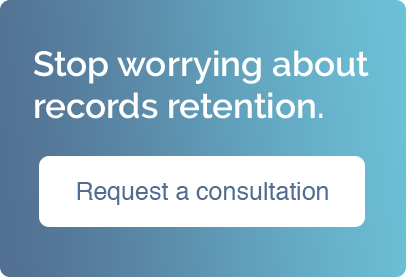Business Records Retention Schedule—What to Keep and What to Throw Out

When creating a business records retention schedule, many business owners often ask, “How do I know if I need to keep the document or not?” We have compiled six guidelines in order to help you make the right decision.
A brief note to keep in mind before we get started: When doing your yearly file purge, make sure that you are aware of what documents you can dispose of and what documents you are required to keep, and for how long. The guidelines outlined below are intended to be general-purpose business record retention schedule guidelines. If you have unusual or extenuating circumstances, be sure to check with your accountant or attorney prior to throwing documents out. Disposing of the wrong documents can result in harsh consequences.
1- Some Documents Should Never be Thrown Out
Documents that should never be thrown out are ones that would be hard to replace if needed to be located later. These documents should be stored in a “Permanent Records” file, preferably located in a fire safe or a safety deposit box. Files that should be in a permanent record include:
• Income tax returns and payment checks
• Legal documents
• Retirement and pension records
• Vital records (birth, death, marriage, divorce, adoption, etc.)
• CPA audit reports
• Trust documents
• Investment trade confirmations and statements that indicate buying and/or selling
2- Business Records Need a Permanent File
Individuals and businesses are held to different standards, with businesses being held to higher standards. Therefore, businesses have much stricter rules to adhere to when it comes to record retention. Even then, certain industries (healthcare, insurance, law, etc.) have their own set of legal standards to follow, which can complicate things even more. Be sure to check with your professional association about their specific policies prior to throwing documents out. In addition to the documents listed above, the following documents should also be found in a business’s permanent record:
• Financial statements
• Stock records
• Purchase receipts
• Documents substantiating fixed-asset additions
• Licenses, patents, trademarks, and registration applications
• Corporate documents (incorporation, bylaws, company minutes, etc.)
3- Tax Records—Keep for 6 Years
The IRS can go back up to 6 years to audit tax returns for errors or incorrectly claimed deductions. Therefore, it is imperative that you keep all tax documents for a minimum of 6 years. Documents that you should keep with your tax documents include:
• Bank records
• Mortgages, deeds, and leases on sold property
• Records on sold stocks and bonds
• Personnel and payroll records
• Purchase and sale records
• Travel and entertainment records
• Vendor invoices
4- Everyday Paperwork—Keep for 3 Years
Unlike tax records, everyday paperwork only needs to be kept and stored for 3 years. While it is exceptionally rare that anyone will want to see a bill that is over a year old, it is recommended to keep these documents just in case. Documents to keep for internal use include:
• Credit card statements
• Utility records
• Employment applications
• Medical bills
5- Miscellaneous Papers—Where Do They Go?
Everyone has those miscellaneous papers that don’t fit into any of the previously mentioned categories. So, the next question is, “Where do these papers go?” The following list of documents should be kept, according to the following guidelines:
• Car records—keep until car is sold
• Credit card receipts—keep until reconciled on your credit card statement
• ATM and deposit slips—keep until reconciled on your bank statement
• Insurance policies—keep for life of the policy
• Pay stubs—keep until reconciled with your W-2
• Property records—keep until property is sold
• Other bills—keep until payment is verified on the next bill
6- Organization is Key
Keeping all of your documents organized, whether they are permanent records or not, is essential in being able to find documents quickly when called for. Use archive quality, acid-free or antimicrobial filing supplies to prevent damage to your stored files. Come up with a filing system that works for you, whether it is color-coded or numbered, and use it.
Information Requirements Clearinghouse (IRCH) offers retention software products and consulting services to help you get your documents organized. We can help you establish a business records retention schedule! Contact us today to learn more about how IRCH can help your business!

